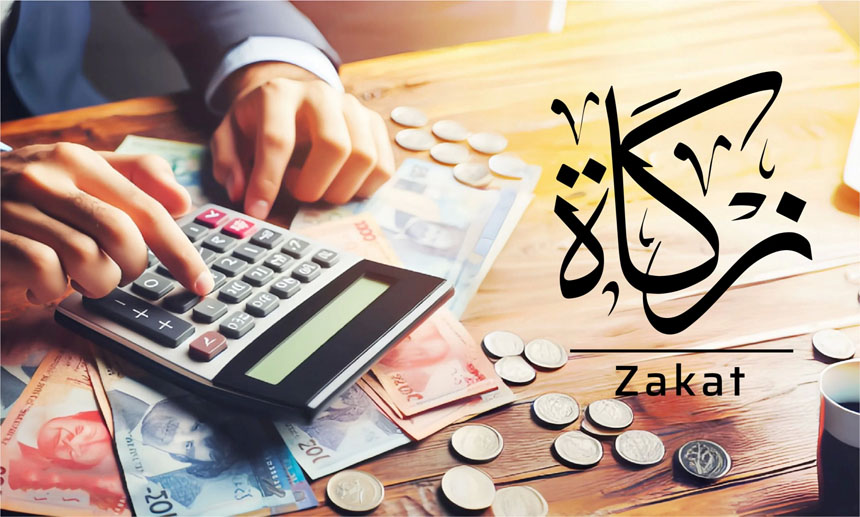Abdus Salam Khan :
Charity is highly valued in nearly every religion around the world, but in Islam, there is a specific form of charity known as Zakat. While it may appear to be an act of kindness, Zakat is actually one of the five pillars of Islam and is an obligatory annual contribution that financially well-off Muslims must make. This contribution consists of a fixed percentage of their wealth or property. This system of Zakat has emerged as a ray of hope for poverty alleviation not only in Bangladesh but across the world too. In some particular countries like Bangladesh, where poverty rates remain high, the proper distribution of Zakat can be an effective tool in combating poverty.
In Islam, Zakat refers to donating a specific portion of one’s wealth for the cause of Allah, typically set at 2.5 per cent. It is not only a right of the poor Muslim but also an important system to assist the underprivileged in society. Through Zakat, wealthy individuals contribute a part of their wealth to the poor, the needy, and others in distress, helping to establish financial balance in society. Zakat is the third pillar of Islam, and it is obligatory for every Muslim who possesses the minimum required amount of wealth, known as nisab. The Quran and Hadith emphasize the significance and rules of Zakat, with several important verses and sayings from the Prophet Muhammad (PBUH) about it:
Allah says in Surah Al-Baqarah (2:110): “Establish the prayer and give Zakat.” This verse highlights the importance of both prayer and Zakat as fundamental pillars of Islam.
In Surah At-Tawbah (9:60), Allah states: “Zakat is for the poor, the needy, those whose hearts are inclined towards Islam, freeing captives, those in debt, and for the cause of Allah, and for the traveler.” This verse outlines the categories of people eligible to receive Zakat.
In Surah Al-Mu’minun (23:4), Allah says: “Successful are the believers who are humble in their prayers, avoid vain speech, and those who pay their Zakat.” This verse underscores the importance of Zakat as an act of devotion.
In Surah Al-Mujadila (58:12), Allah mentions: “O you who have believed, when you consult the Messenger, give charity before your consultation.” This directive emphasizes the role of charity in the life of a Muslim.
Prophet Muhammad (PBUH) stated in Ibn Majah (Hadith 1/950): “If a person hoards wealth and does not pay Zakat, they will be held accountable for it.” This Hadith emphasizes the consequences of failing to give Zakat. In Sahih Muslim (Hadith 4), the Prophet (PBUH) said: “Zakat purifies your wealth and is a sign of submission to Allah.” Zakat purifies wealth, and failure to give it results in consequences, such as poverty and hardship (Tabarani).
The primary purpose of Zakat is for the wealthy to give a portion of their wealth to the poor, helping to achieve economic balance and financial stability within society. It represents obedience to Allah and serves as a means of both spiritual and material improvement.
Bangladesh, a country historically plagued by poverty, has the potential for Zakat to play a significant role in alleviating poverty. Around 20-25 per cent of the population lives below the poverty line, and if Zakat is distributed effectively, it can lead to positive changes in their lives. The Islamic Foundation plays a crucial role in managing Zakat in Bangladesh, collecting and distributing it annually. Various religious organizations and institutions are also working to reduce poverty through Zakat. Although there are some challenges in the collection and distribution of Zakat, it has still contributed to improving the living standards of many poor people.
When Zakat is applied correctly, it can bring about significant socio-economic change. Zakat not only helps the poor but also promotes justice, empathy, and solidarity within society. In countries like Bangladesh, where there is a stark economic divide, Zakat can help bridge the gap between the rich and the poor and foster humanitarian relationships.
In Bangladesh, the use of modern technology in the management of Zakat is increasing. Online platforms are now used for the collection and distribution of Zakat, ensuring a more efficient and transparent process. Various organizations such as the Islamic Foundation, the Center for Zakat Management, madrassas, and NGOs are involved in this process, and with government support, the system could expand even further.
The Islamic Foundation has developed a Zakat Management System application. Under the “Mobile Game and Application Skills Development” project by the Ministry of Information and Communication Technology, this app has been created to facilitate online Zakat contributions. Through this app, donors can receive receipts and certificates immediately upon giving Zakat. It allows for quick and easy online Zakat payment from home, including by expatriates abroad. The app provides information on Zakat guidelines, eligibility, collection, distribution, and how Zakat should be calculated.
Zakat is one of the five pillars of Islam. If a Muslim man or woman possesses the required amount of wealth (nisab), Zakat becomes obligatory for them under certain conditions. With proper planning and implementation, Zakat can help eradicate poverty in society, leading to prosperity for the nation and the world. Hence, it is urged that wealthy Muslims, both within Bangladesh and abroad, contribute to alleviating poverty by using the Zakat application to donate to the government Zakat fund. It is worth noting that donations to the government Zakat fund are exempt from income tax, and the Zakat certificate can be used to reduce taxable income.
Zakat is a vital socio-economic institution in Islam. In a poverty-stricken country like Bangladesh, proper management of Zakat can play an essential role in poverty alleviation. With the support of institutions like the Islamic Foundation, the Zakat system in Bangladesh can be strengthened. If the management is further organized and effective, poverty in Bangladesh could be alleviated, and the country could achieve greater prosperity in the near future.
[The author is Director General, Islamic Foundation (Senior District & Sessions Judge)].



